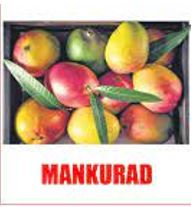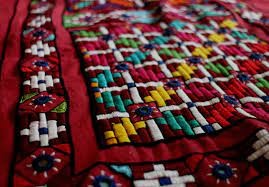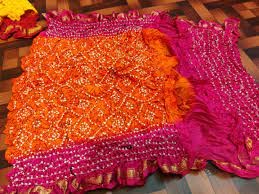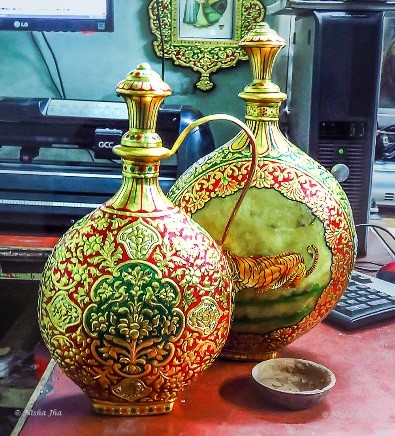WorldCoin Project
WorldCoin project launched by OpenAI has claimed over 2 million sign-ups across the world.
- Aim - To provide a unique, verified identity for everyone.
- Worldcoin is an initiative to create a digital network in which everyone can claim some kind of stake, and join the digital economy.
|
Three aspects of the World Coin
|
|
World ID
|
It provides an individual’s unique personhood.
|
|
Worldcoin token (WLD)
|
It is a token based on the Ethereum blockchain.
|
|
World App
|
Payment, purchases and transfers globally using digital assets and traditional currencies.
|
Ethereum has a native coin, Ether, which is the second-largest crypto by market capitalisation. However, anyone can create a token which runs on the Ethereum blockchain. WLD is one such cryptocurrency.
- Working - Using a device called “Orb,” Worldcoin volunteers known as ‘Orb operators’ scan a person’s iris pattern to collect their biometric data and help them get a World ID through the World app.
- With the app, scanned participants can collect a cryptocurrency called Worldcoin [WLD] at regular intervals or make transactions with their World ID where possible.
- This process is called “proof of personhood” and makes sure that people do not sign themselves up multiple times in exchange for crypto.
- It is intended to be the world’s largest identity and financial public network, open to everyone regardless of their country, background or economic status.
- Uses - Biometric data would help differentiate between humans and Artificial Intelligence systems and prevent duplication of IDs from the same person.
- It can be used as an ID in a variety of everyday applications such as a cryptocurrency wallet without revealing the user’s identity.
- Countries that has higher sign-up of users are France, Germany and Kenya, India and U.S.
- Concerns - WLD’s price is prone to fluctuation.
- The chances of being scammed or even hacked are high.
References
1. The Indian Express | WorldCoin, the crypto project
2. The Hindu | Sam Altman’s biometric project
Akira
Recently the central government’s Computer Emergency Response Team (CERT-In) issued an advisory flagging the emergence of a new ransomware called Akira.
- About - It is a kind of malware, a software used to gain unauthorised access to systems to steal data.
- Operating system - Akira targets computer systems that run on Windows and Linux operating systems and is known to spread laterally across networks.
- Akira steals personal data, encrypts it, and later extorts money from the victims.
- Technique - It uses a double-extortion technique to exfiltrate and encrypt data to increase the chances of extracting money from its victims.
- In case a user refuses to pay, the ransomware actors threaten to release their data on the dark web.
- This Akira is different from the Akira ransomware that was flagged by Microsoft Defender Antivirus in 2017.
- Impacts
- Loss of valuable data
- Loss of reputation and integrity
- Massive financial losses.
- Sensitive information can be lost, misused in darkweb.
Reference
The Indian Express | Akira
UIDAI's initiative to prevent AePS frauds
As frauds related to the Aadhaar-enabled Payment System (AePS) are high, the Unique Identification Authority of India (UIDAI), has turned to artificial intelligence-based systems in a bid to limit the cases.
Aadhar enabled payment systems
- AEPS is a bank led model which allows online interoperable financial transaction at PoS (Point of Sale / Micro ATM) through the Business Correspondent (BC)/Bank Mitra of any bank using the Aadhaar authentication.
UIDAI’s Intiatives
Aadhar fingerprint technology
- The technology was rolled out in February, 2023.
- The newly introduced AI-based fingerprint authentication mechanism is for securing Aadhaar-based transactions by the Unique Identification Authority of India (UIDAI).
- The AePS enables transactions through Aadhaar authentication using just the bank name, Aadhaar number and fingerprint of the individual recorded during enrolment.
- The problem gets compounded on account of the fact that a large part of the AePS user base is in rural areas.
- To prevent Aeps frauds by the use of spoofed fingerprints during Aadhar authentication, the UIDAI has rolled out an in-house Artificial Intelligence/Machine Learning technology.
- It is based on Finger Minutiae Record – Finger Image Record (FMR-FIR) modality which is able to check the liveness of a fingerprint to detect the use of cloned fingerprint during the authentication process.
Facial recognition technology
- In May, 2023 Airtel Payments Bank collaborated with the National Payments Corporation of India (NPCI) to roll out a facial recognition-based authentication measure for such transactions.
- The technology has been developed in-house by the UIDAI.
Concerns
- A business correspondent (BC) is an informal bank agent equipped with a biometric Point-of-Sale (PoS) machine, which works like a micro ATM.
- If someone needs amount, they have to give their bank details to the BC along with their Aadhaar-based biometric details and the BC will give them the required amount.
- However BCs misrepresent the amount they have paid an individual and input a higher amount in their system.
- There have also been instances of fingerprint cloning, which AI-based technologies.
According to the Home Ministry, in 2022 there were 6.94 lakhs financial crimes, such as money laundering, bribery, corruption and different kinds of frauds.
References
1. The Indian Express | UIDAI is using AI to tackle payment frauds
2. IPPB | Aadhaar Enabled Payment System
GI tags from Rajasthan and U.P.
Seven products from across India, including four from Rajasthan, were given the Geographical Indication (GI) tag by the Geographical Indications Registry in Chennai.
|
Products
|
Types
|
States
|
|
Jalesar Dhatu Shilp
|
Metal craft
|
U.P.
|
|
Goa Mankurad Mango
|
Food Item
|
Goa
|
|
Goan Bebinca
|
Food Item
|
Goa
|
|
Udaipur Koftgari Metal Craft
|
Metal Craft
|
Rajasthan
|
|
Bikaner Kashidakari Craft
|
Embroidery
|
Rajasthan
|
|
Jodhpur Bandhej Craft
|
Dress material
|
Rajasthan
|
|
Bikaner Usta Kala Craft
|
Craft
|
Rajasthan
|
Jalesar Dhatu Shilp
- It is a metal craft famous in the Jalesar in Etah district, Uttar Pradesh.
- It includes ghungrus (anklets), ghantis (bells) and other decorative metal craft and brassware.
- The bells casted in Etah district’s soil ring better.
- Community - The Thatheras community, which resides in Hathuras, involved in making of these products.

Goa Mankurad Mango
- The Goa Mankurad is the major fruit of Goa.
- Colour - Malcorada (Mankurad mango) holds position as the king of mangoes for its yellowish-golden or orange colour.
- Taste - It holds a complex taste of honey caramel tempered with a taste of all spice and cinnamon.

Goan Bebinca
- Bebinca also known as bibik or Bebinca.
- It is a type of pudding and a traditional Indo-Portuguese dessert.
- It is a classic and popular Goan dessert.
- Traditional Bebinca has 16 layers but mainly prefered 7 layers.
- It is prepared by using coconut milk & local Eggs of Goa.

Udaipur Koftgari Metal Craft
- The Udaipur Koftgari Metal craftsmen practices the ancient art of Koftgari used in making ornamental weaponry at Udaipur, Rajasthan.
- Uniqueness - The specialty of Koftgari is that the whole design is produced mainly by wire.
- Koftgari is an ornamental art where pure gold and pure silver inlay work is done on iron base.
- Region - The Koftgari Metal craft is prominently known from the Rajputana region of Mewar which has known now as Udaipur and Chittorgarh region.

Bikaner Kashidakari Craft
- Bikaner Kashidakari is an exclusive women oriented embroidering by putting traditional skills.
- Bikaner Kashidakari crafts are practiced as gift items.
- Community - The gift items are made by the women of the Meghwal community of Bikaner and are often a testament to the skills learnt by the new bride

Jodhpur Bandhej Craft
- Bandhej is a tie-die technique evolved in Jodhpur, Rajasthan.
- Bandhej craft is a highly skilled process an excellent example of the human skill with the color combination and minute work with the passion.
- Main Centers - Jodhpur, Nagaur, Churu and Barmer in Rajasthan.

Bikaner Usta Kala Craft
- Bikaner Usta Kala craft is a craft of Bikaner, Rajasthan.
- Bikaner Usta Kala craft involve paintings with gold and spaces filled with bright meenacolours and vice versa.
- It can be done on various surfaces; the only condition is that it has to be smooth.
- Nakashi and Manouati, both are types of Usta work using real gold, handmade paints and executed with fine line “Siyahi” technique.
- The ink (Sihayi) is used with a brush made of Squirrel hair to fill the design with different colours.

References
- The Hindu | GI tags for crafts from Rajasthan and U.P.
- IP India | About GI tags
Great Barrier Reef
A UNESCO heritage committee recently took off Australia's Great barrier reef from UNESCO danger list but warned the ecosystem is still remained under serious threat.
- Australia’s Great Barrier Reef is the world’s largest reef system.
- It stretches across 2,300 km and has nearly 3,000 individual reefs.
- It hosts 400 different types of coral and gives shelter to 1,500 species of fish and 4,000 types of mollusc.
- Coral reefs support over 25% of marine biodiversity even as they take up only 1% of the seafloor.
- The marine life supported by reefs further fuels global fishing industries.

- Way forward - The UN panel has asked the government to submit a progress report by February 2024.
- The World Wide Fund for Nature-Australia said UNESCO could place the reef on the endangered list if the government failed to demonstrate progress on existing commitments.
UNESCO
- The United Nations Educational, Scientific and Cultural Organization.
- UNESCO contributes to peace and security by promoting collaboration among the nations through education, science and culture in order to further universal respect for justice, the rule of law and human rights and fundamental freedoms.
Reference
1. The Hindu | Great Barrier Reef






